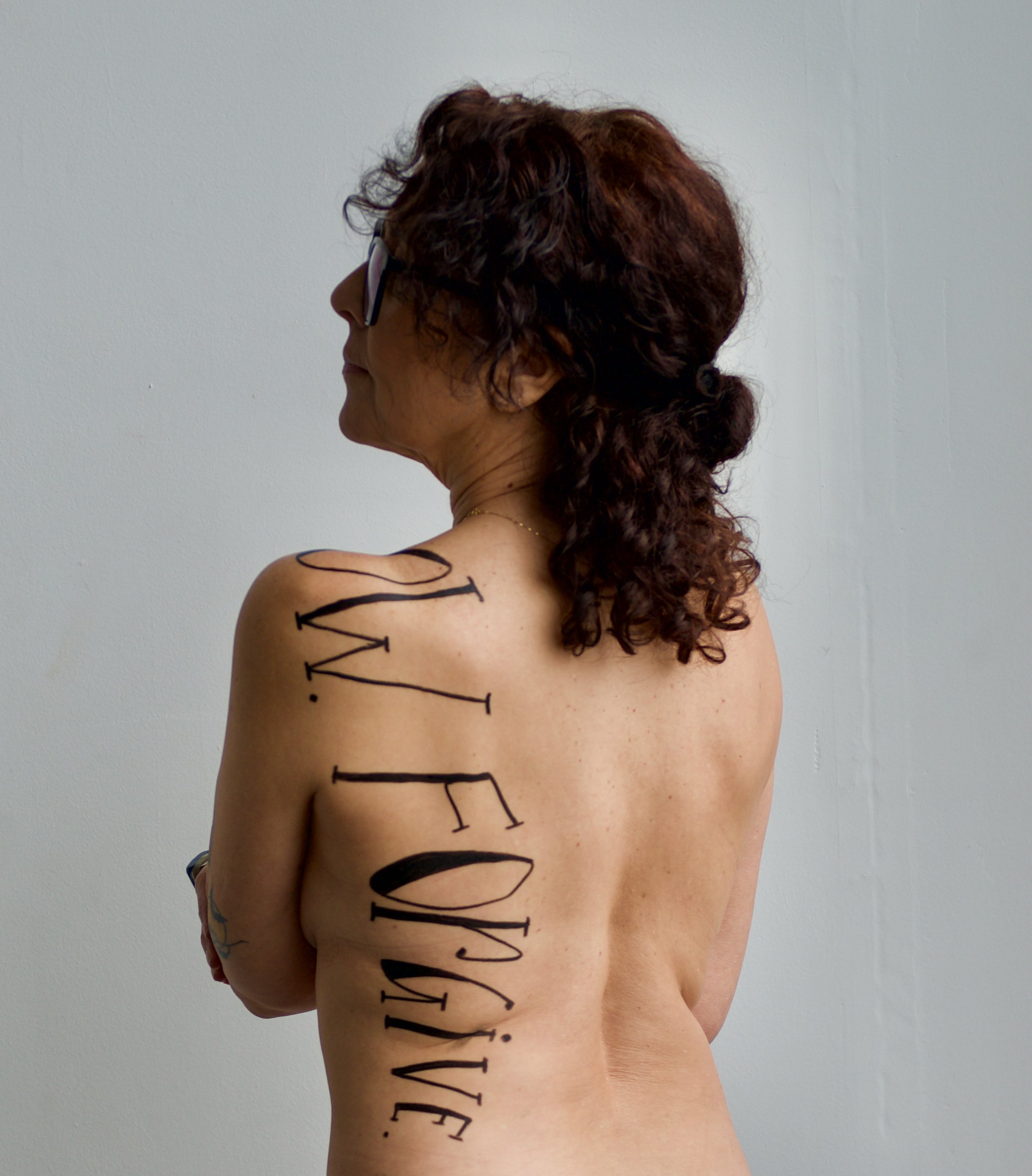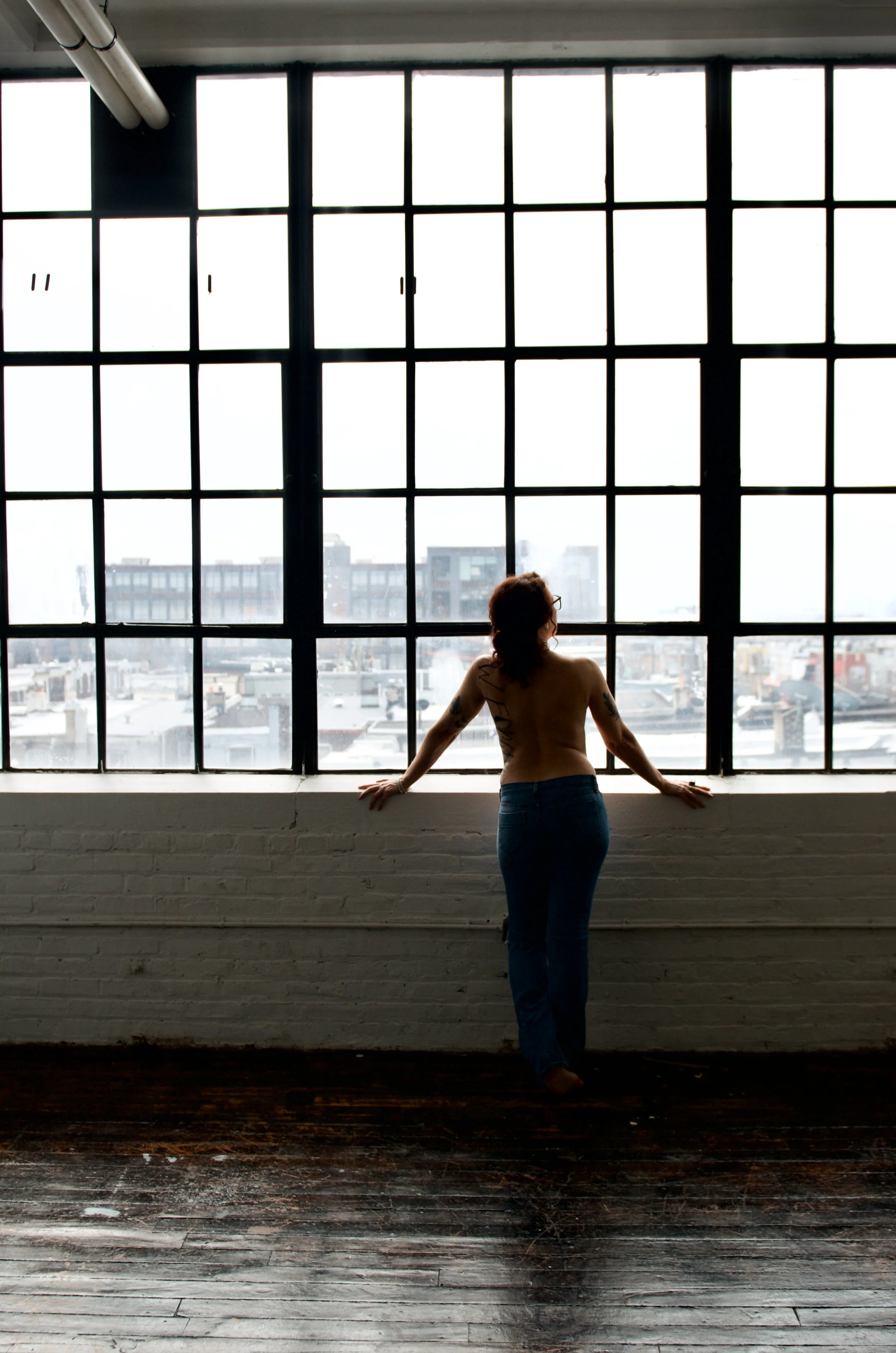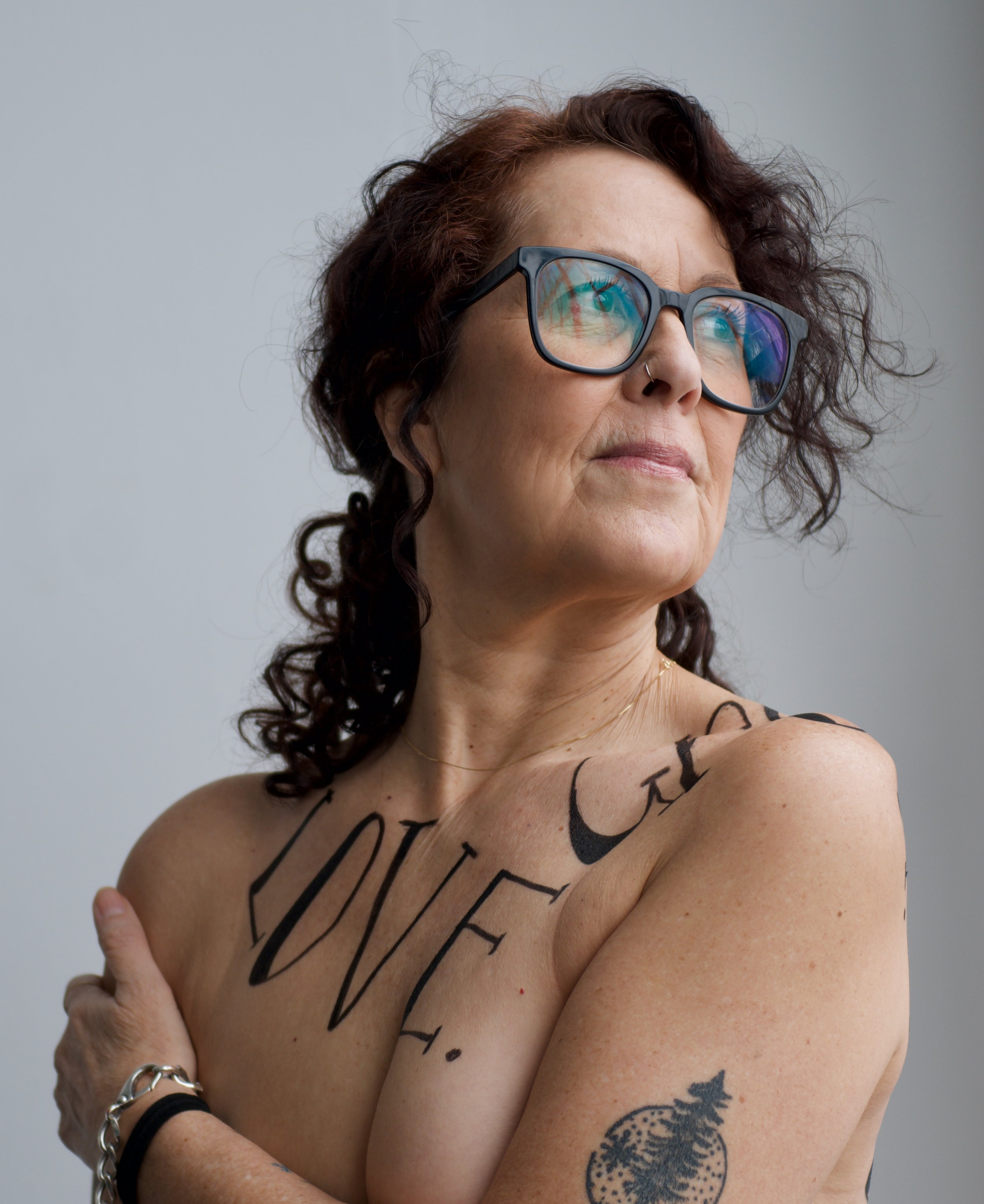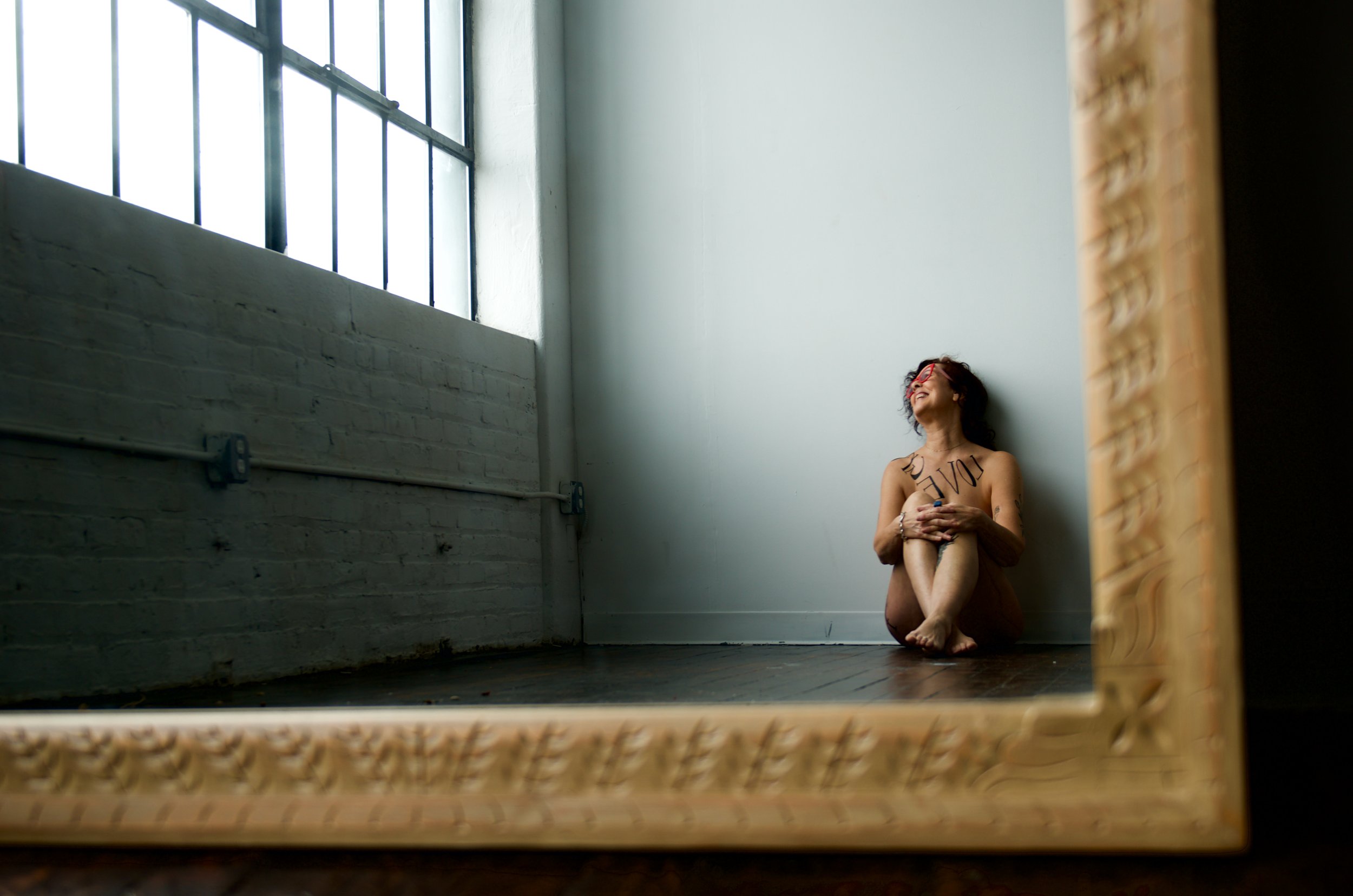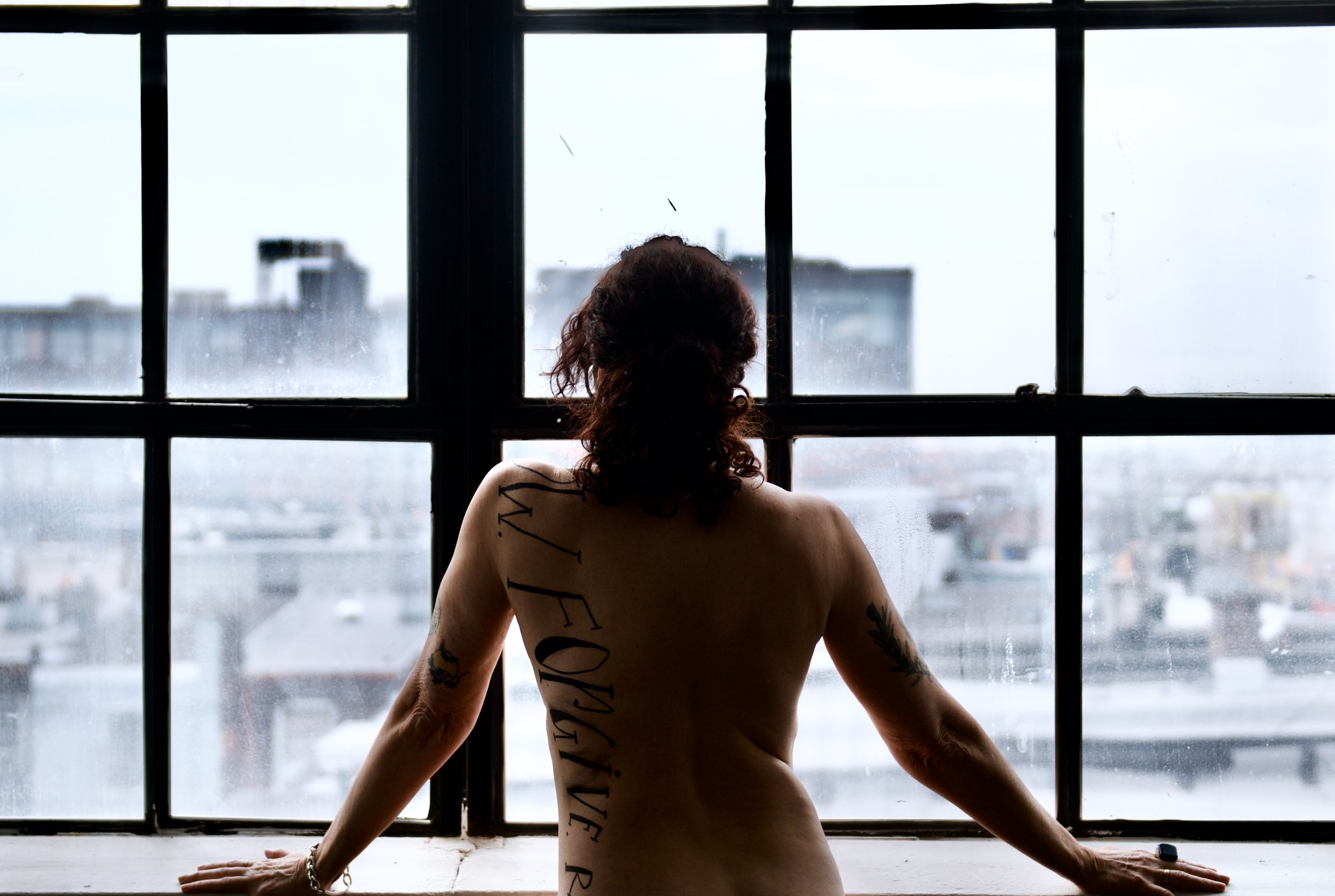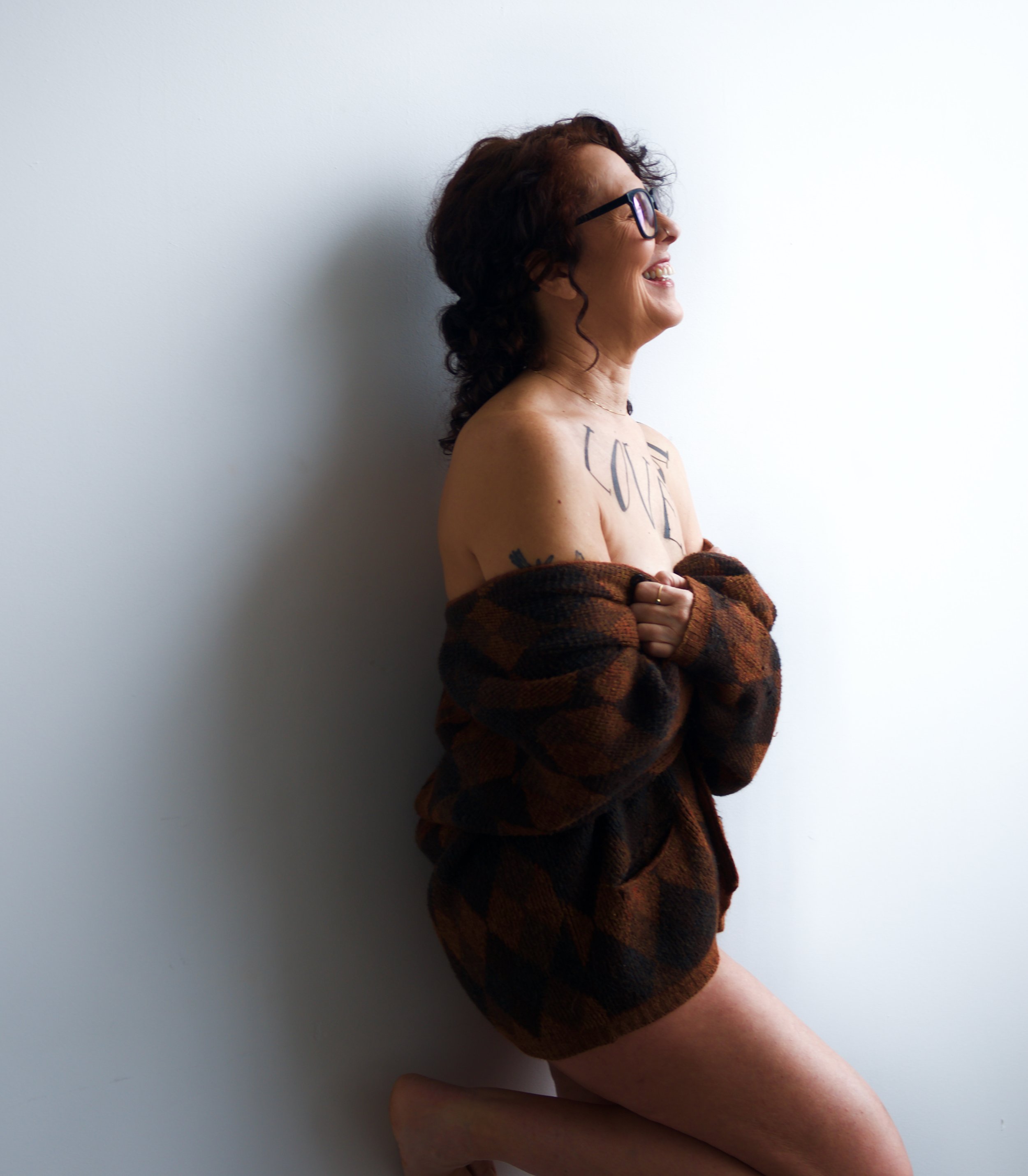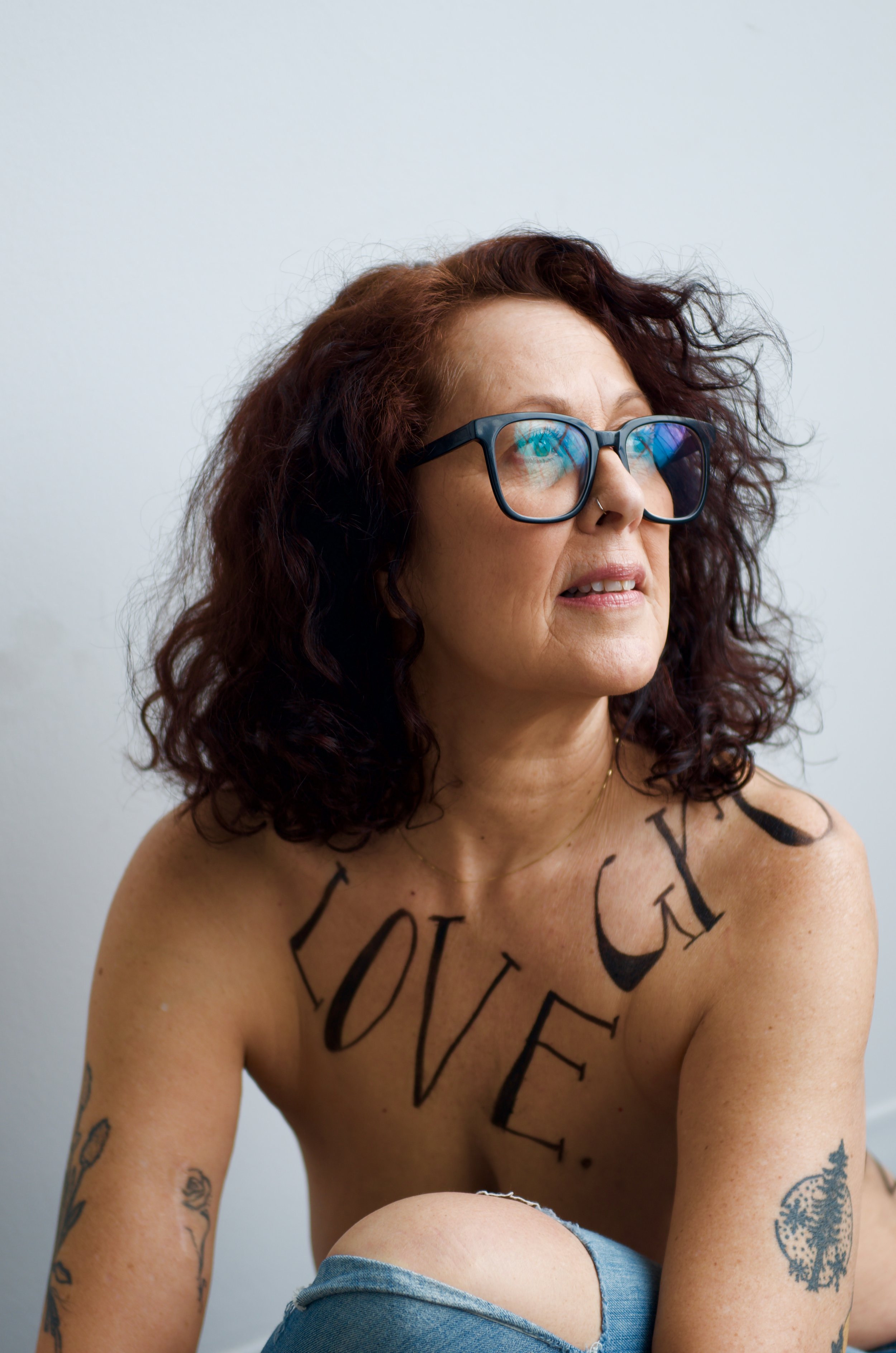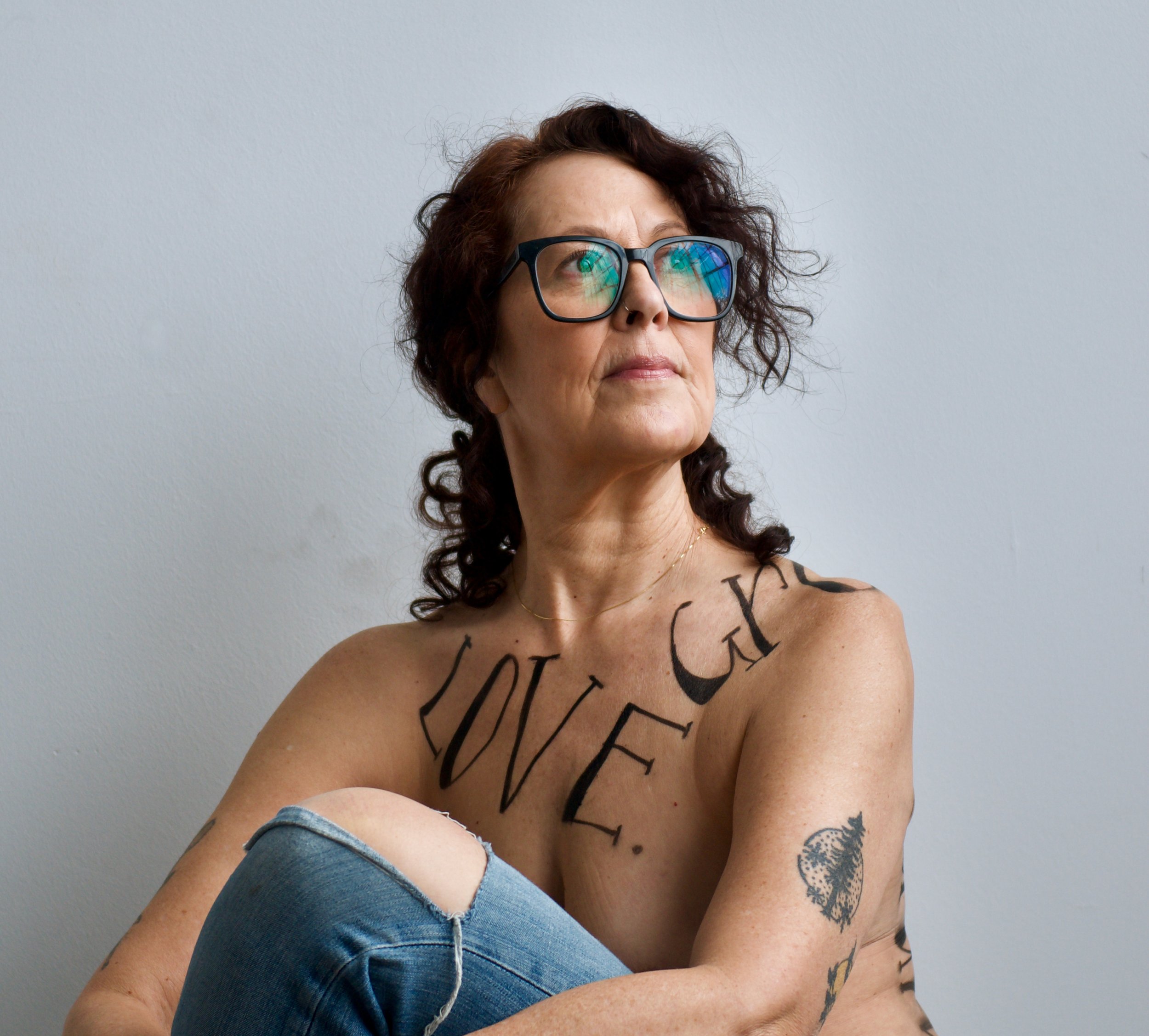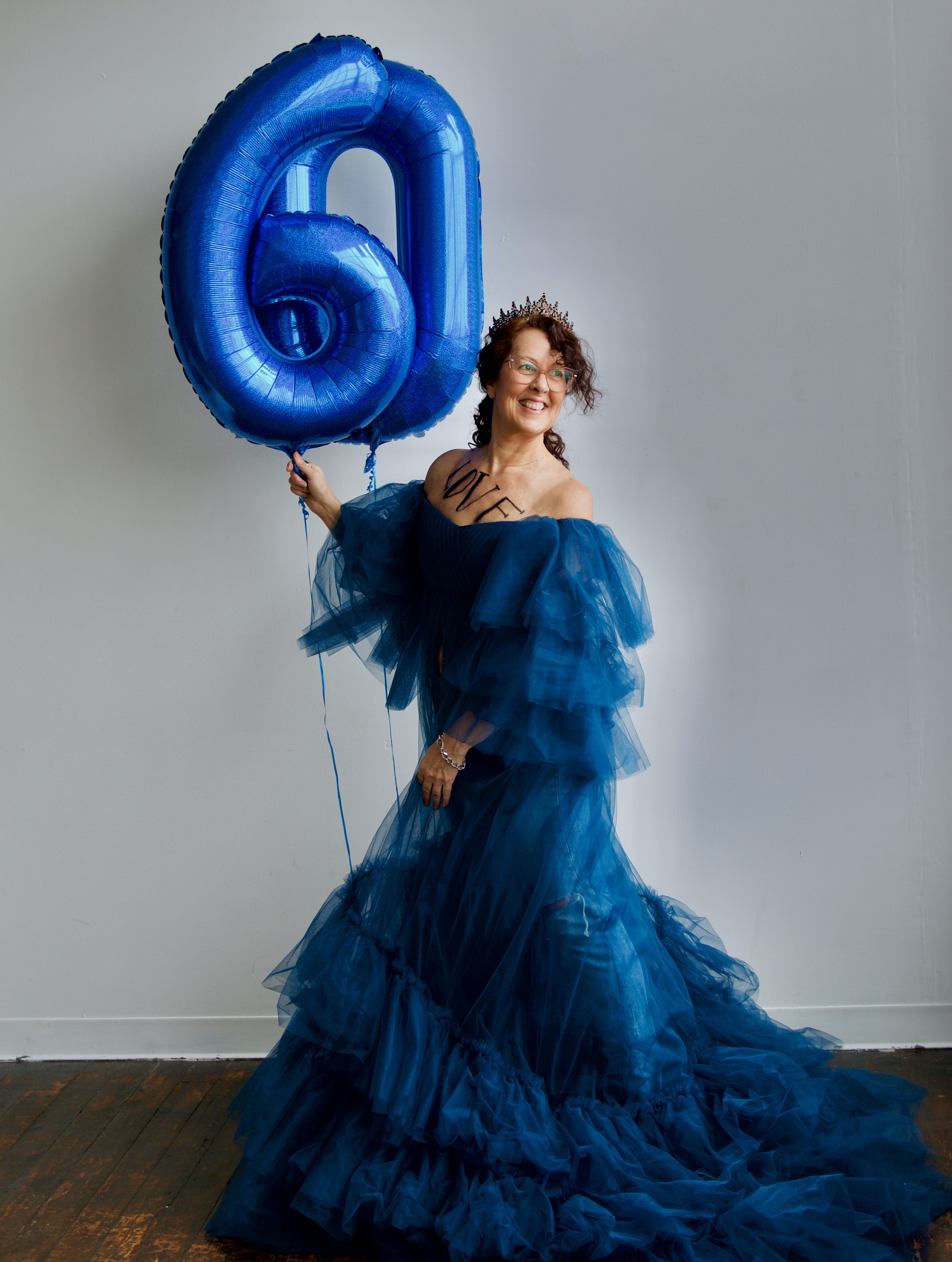Beth
“Love. Grow. FORGIVE. Repeat.”By Beth Ellen Jarvie and Kari Marton-Rollins
Last month, I celebrated a big birthday: my 60th. This project has come at a perfect moment of reflection for me. The idea of stripping things down and looking at where I’ve been and where I’m heading feels right.I’m not really sure where to start. It might be better to go backward.I’m currently living with my mom in my childhood home. It’s the only house I lived in as a kid. I’m sleeping in the bedroom I grew up in. The wallpaper is still the same. When I first moved in, I said, “Ok, I need to redecorate,” and my mom said, “Oh no, I love that wallpaper; you’re not taking that down.” I was only supposed to be here temporarily, and she didn’t want me making any significant changes. It will be four years this summer. The wallpaper is still the same.I moved in during the pandemic. My mom was 85 at the time. My dad had died several years before, and she was on her own. She doesn’t drive, and she isn’t big on using technology to stay engaged with everyone, so she got a bit disconnected. She was really alone and justifiably frightened, as we all were. She was very leery about letting anyone in the house, even family, because we were all still working and doing things out in the world. So we would literally just drop groceries off on the porch and wave from the driveway.I had been divorced for a couple of years, and although I had recently gotten engaged, I was living on my own in an apartment I really didn’t like very much. One day, while talking to Mom on the phone, I started hearing things in her voice that concerned me. She started crying and talking about her fear of getting Covid and being in the hospital alone, unable to see us. Without thinking too much about it, I said, “Mom, would you feel better if I came to stay with you for a little while until things blow over?” She immediately perked up, and I felt like I made the right decision. My fiancé wasn’t very happy with this spontaneous change, and not too long after I moved in, he became my ex-fiancé. And that was that. I was in my late 50’s, single, and living with my mom.In October, my son had some serious health issues, so he came to stay with us. The pandemic being what it was in the fall of 2020, he decided it was best to give up his place in Brooklyn and stick it out down here. It was a long haul getting his health back in check, and I certainly couldn't have had him stay in my little one-room apartment, so I was really grateful that I was living in a space with room for him. He hasn’t left either. I think three generations living together works well; we all buffer and enhance each other. My son and I both went through major breakups within a few months of one another. I was thankful for his perspective and support during that time; he is extremely insightful and intuitive. I think being here with Mom and me helped him stay positive during his health issues and breakup. He may see it differently. I’m happy to say he is now healthy and in a great relationship with a wonderful woman who also lives with us.My mom has one house rule: If you are home at 7:00 pm, you must watch Jeopardy, followed by Wheel of Fortune. If you are not home, why aren’t you? It’s like you have to have a doctor’s note to be absent. She’ll yell from the living room, “Jeopardy!” at 7:00 pm sharp. It’s so ingrained in all of us, that my son will text me “Jeopardy!” at 7:00 pm if he’s not home. If I have an after-hours work event or even a date, she’ll say, “Will you be home in time for Jeopardy?” And I’ll say, “No, I won’t be home for Jeopardy.” And she’ll be like, “Ohh ok, that’s ok.” You know? The mother's guilt. I realize there will be a time when she doesn't yell Jeopardy anymore, and I know how much I will miss it, so I try to be home every night by 7:00 pm.Our first year together, we were all just chugging along, navigating through the pandemic, finding quiet space to take work-from-home meetings, figuring out my son’s health issues (he was on a liquid diet for close to 2 years), answering Jeopardy questions, and learning how to be mother/daughter/son/grandson/grandmother roommates. My daughter was newly engaged, so there was a lot of celebrating and wedding planning going on, which was a wonderful distraction.In the fall of 2021, my mom started having her own health issues, and a few days after Thanksgiving, she ended up in the hospital. She spent the next few months bouncing in and out of the hospital; we would get on top of one issue, and then something else would spring up. It got dicey a few times, which was super scary. Hospital visitations were limited at that time due to a resurgence of Covid, and the nursing staff was extremely overworked. It was a very stressful period for Mom and the rest of us. All her fears from the year before were coming true; she was in the hospital alone.When she was home, it felt less worrisome, but she needed a ton of care. Once again, I was grateful that we were all under one roof. It was an all-hands-on-deck moment. She required round-the-clock care, to the point of needing help even to roll over in her bed in the middle of the night. My daughter's upcoming wedding was the light at the end of the tunnel. During a low point, I was talking to my mom about getting her a dress, and she said she wasn't going to spend time looking for a dress because she was sure she wouldn't make it to the wedding. My niece was also due to have my mom’s first great-grandchild. I was having to remind my mom that there was so much to fight for - that she should keep going.When people talk about taking care of their aging parents, they rarely talk about the mental health care that goes into it. My mom was physically unwell, but her mind was/is as sharp as a tack, so she could see what was ahead when things were bad. I remember spending equal amounts of time caring for her physically and trying to keep her spirits up, which was quite draining.I was so grateful to be living with my son and his girlfriend at that time, because we could tag in and out when we needed a break. My daughter and her fiancé would also jump in so I could have a getaway now and then. Despite the ups and downs, Mom did indeed meet her first great-grandbaby. She danced at my daughter's wedding, and today she is awaiting the arrival of her second great-grandbaby. Although all her health issues are not behind her, she has regained a great deal of her independence and is enjoying life again. We are all very lucky.Mom is currently in hospice care at home. I know hospice sounds like a scary word, but it has been so essential to getting her back on her feet. When we first heard those words, we both freaked out, but now we think of it as just care for somebody who has a critical illness - it doesn’t necessarily determine how long you have left. My mom could end up living for years; the bottom line is that the major health issue she has - advanced liver disease - will not go away, and it is untreatable at her age, so she is eligible for hospice care.The care is amazing, and the caregivers are extremely dedicated and very kind to us all, even to our cat. It has just been a beautiful process. Today, for instance, I got a call about the storm coming tomorrow, and they said, “Do you have everything you need? Do you need groceries? Do you need us to run to the store? Is Mom in a good place? If not, we can get her in a rehab…” You know? It’s just brilliant. All of our meds get delivered. I don’t have to go to the pharmacy anymore, and I don’t have to be her nurse, which I was starting to have to do. I’m a nurturer, so that’s not an unusual space for me to be in, but the dynamics of our relationship… I just didn’t want to go there. I wanted to support her as her daughter and not become her nurse. So I feel really thankful that hospice has allowed me to step out of the caregiver role and regain our mother/daughter relationship and friendship.But of course, there are some challenges to living with my mom and son. I’m going to be totally honest - I’m thrilled that I’m here, and I see the advantages to Mom and myself, but it can be tricky. There’s not a ton of privacy (four people, one bathroom!). I can’t be spontaneous and pick up and go, whether it’s for a weekend to visit a friend or out for a bite to eat after work. It’s expected that I check in and explain where I am going, what I am doing… Of course, that isn't a lot to ask, but sometimes I like to just go.I was only two years out of an almost 30-year marriage when I moved in here, and those two years were the first time in my life that I had ever lived alone. I moved in with my ex-husband when I was 18, and I moved out on my own at 53. It was a lot to adjust to, and I was just starting to enjoy my autonomy, when I came back home. After raising kids and taking care of my family, I finally felt like it was a moment when I could figure out what I wanted. It took a while to get comfortable with that, and now it’s all kind of on hold. Suddenly, I’m moving into my 60s, and I’m thinking, “Hey, am I going to get that time for myself… ever?”
One of the quotes I had been thinking about using was, “It’s never too late to be what you might have been.” And I think about that quite a bit. I’ve always been a nurturer, and I’ve always been a caretaker, and I thought that this might be my time to find out what else I could do. But I find myself once again in a caregiver role. There’s no bitterness, but there are some days where I’m just like - really? I guess everyone feels that way sometimes. But the personal growth part of my life does feel like it is on hold right now. And there is fear that it’s going to be too late.
Whenever I say that to anyone, the answer is often, “It’s never too late!” But I would have really preferred if I had gotten my personal stuff in order five years ago, right? When I tell people I just turned 60, they often brush it off and make light of it - age is just a number and all that - but those numbers actually do matter. I just turned 60, so being absolutely realistic, I figure I only have about 20-odd summers left. And who knows how many of them will be healthy, independent summers. When I put it that way, it gives people pause. I have things I want to do. I look at that timeline and figure I should just do the stuff I want to do now. But then I also know that there will be a time when my mom and I aren’t together anymore and when my son moves out on his own again, and I will cherish all this time I spent here.One of the things that is nearly impossible to maintain in this situation is a sex life. This might be too much information, but if I'm being completely honest, having an intimate relationship with another human being is extremely important to me. One of my biggest fears is that when I have a more autonomous lifestyle, I’ll be at a point where I won’t want a sex life anymore. I know this is a difficult topic to discuss, but I talk to so many women my age and even younger who are not interested in having sex anymore. And I’m like, “You don’t want that? Aren’t you missing that? You really don’t want that?” And they’re like, “No, I’m done, I’m done with that.” But… really? I feel like I just got started! Online dating, let me just say - it sucks, because it isn’t dating. There’s no dating. No one understands how to date. I was just chatting with a guy, and he totally ghosted me because he said, “I’m not looking for anything serious right now.” I said, “Well, neither am I.” And he said, “Ok, you’re down for a hookup?” And I said, “No… there is something in between a serious, committed relationship and casual sex. It’s called dating!” And off he went. It’s also a major time suck - you can spend hours searching, matching, and coming up with witty banter to end up with nothing. Why can’t you just take me to the movies or dinner once or twice a month? If we mesh and want to move things into a physical relationship, we can figure out a time and place for that. It’s really not rocket science. But for some reason, dating apps seem to foster an all-or-nothing culture.My 30-year marriage ended a few years before the pandemic hit. It was amicable…ish. My ex and I had been together since we were 18 years old. We grew up together; it may sound strange, but I consider him like a brother. I don’t always like him, but I’ll always love him. He holds all my history. We hold each other’s history. Untangling myself from who I was with him and figuring out who I am separately has been really, really hard. It took being away from him for a good year to even start the process. Who am I? What do I like? What do I not like? What do I like to do? I am still figuring some of that out six years later.That untangling allowed me to grow. I’m not the same person I was six years ago, and I’m certainly not the same person I was 36 years ago when I got married. I’m really happy to have gone through that process, even though a lot of it was painful. I look back on my marriage with more smiles than tears. That relationship gave me so many wonderful things: beautiful children, significant friendships, life-changing experiences, and so much laughter, so much happiness. But it had a shelf life. It was a great marriage for a while; I think it was successful for nearly 20 years. I’m not sure my ex will agree, but that is how I honestly feel.I know it sounds so cliche, but you know the expression, “Don’t be sad it’s over, be happy it happened?” I now know what it’s like to process that for real. As a tight-knit family of four, we had a great time. We spent a lot of time together; we played games, cooked, traveled, and we honestly enjoyed each other's company. As our children grew, we all became friends, and we became friends with their friends. It was very special. For a long time, I was really sad about losing all of that. A lot happened during the divorce that didn't allow us to maintain that close-knit relationship. Now, I just feel thankful that my kids had a fun, happy, loving childhood and that they have become two of my favorite adults. You mourn your children as they grow. You have to mourn. When this wonderful growth happens for them and you’re so proud of them - like when they lose their first tooth, learn to read, or go on their first date - you’re also saying goodbye to a part of that person that’s never coming back. And it’s really tough. I think you need to be conscious of these stages and acknowledge all the endings you see as a parent, or it will whack you at some point. Right? Likewise, I had to mourn our family. But as with children, our family is still growing and changing, and that is a beautiful thing.I was 26 years old when I had my daughter. It was in the ‘90s. I went to a midwife, which was not as common back then. One of the reasons that I decided to use a midwife was because my mother didn’t have any memory of her births. She was sedated as soon as she was ready to push, which was the norm in the 50’s and 60’s. So when it came time for me to give birth, she didn’t have any memory of her own births. I was just looking for someone to help me have an experience that didn’t seem so medical. I really admired my midwives, and I wished I could be doing that work. When my kids were teenagers, my sister-in-law became a doula. She’s originally from Wales, where doula work is very commonplace. I had never heard the word before, and I knew nothing about it. Once I researched and learned that a doula provides physical and emotional support to women and their partners during pregnancy and childbirth, I was like, “That’s it!” A lot of my high school friends became nurses. But I wasn’t an academic kid, and I didn’t think I had the brains to get a nursing degree, which is something I have always regretted. So, the idea of becoming a doula was very appealing. Gaining expertise that I could share with women and help provide a positive birth experience felt like something I was made for.I never wanted to make a living out of being a doula - I wanted to be able to be selective and make sure that there was an emotional connection to the people I was working with. One big motivating factor for me in choosing this path was the many young women in my children’s lives. There were all of these young women who I was close to, and I wanted to help them through this process if they needed help. (I am so thrilled that I have been able to serve as a doula for many of the women who inspired me to become a doula.) Sometimes, the dynamics between moms and daughters aren’t conducive to sharing an intense experience like childbirth together. I just wanted to be like everybody’s Auntie. A familiar face, a reassuring friend, in what can be a stressful space. Even if it was literally just to hold their hand and say, “This is all good. You’re doing great.”Being a doula is just… I don’t even know how to explain it. It’s a privilege, it’s such an honor, that people let me into that space. And it’s mind-boggling to me, because I get so much out of it myself. I feel absolute gratitude that I’ve been able to be there and that I’ve had very positive birth experiences. There’s an energy from that bravery that is… there’s no word for it. And I think that’s what connects me with moms, partners, and children. There’s just this shared intensity about birth that has everything wrapped up in it - fear, joy, gratitude, love, and this ancient collectiveness. I really feel that young women should be taught more about how their bodies work and what they might experience during birth throughout their lives so that when they get pregnant, it’s not the first time they hear certain words or learn about the multitude of ways their body will change and adapt to growing a baby. Our culture seems so afraid, you know? Afraid to talk about our humanness. We put so much emphasis on gender reveal parties and birth announcements, but we aren't talking about the stuff that really matters. And I don’t know why. I just want young women to have all of the information, tools, and resources they need to have the birth that they want. If they want drugs, we have tools that can allow for beautiful, natural births that involve medical interventions, including pain management medications. If they want to have a scheduled c-section, I am totally ok with that. But I want to be sure my moms have all the information they need to make informed decisions. I think the up-and-coming generation is a little more aware of the importance of caring for their bodies and minds. But the experiential stuff, where you have conversations with your aunties and your moms… I worry that’s not going on. It used to be that you would learn from your mom who had six children. Maybe you lived in a multigenerational house and would get exposed to all different ages throughout your life. And even if it wasn’t a multigenerational house, we lived in neighborhoods with our families close by, so you could ride your bike to your aunt’s house or ride a bike to your grandmother’s house. We don’t see that as much anymore. Success is moving away from your family and having a big house all to yourself. That’s our definition of success these days, right?When I moved back here in my late 50s, it felt like I was taking a step backward, like it indicated a kind of failure. I don’t own a home anymore. I don’t even have an apartment. I don’t have my own furniture, I don’t have my things… This is where I am? I’m going to be 60 years old, and what do I have? And how does that look to most people? “Where do you live?” “I live with my mother and my son.” It doesn’t usually get a positive reaction. Especially trying to date. But then, when you say, “Oh, well, my mom is sick, and I need to help,” I hear, “Oh, you’re so nice; that’s so nice of you.” It feels like I need an excuse for others to say, “I get why you’re doing that.” It wouldn’t occur to people that we all choose to live together now. It started as a necessity, but now it’s a choice.This isn’t the first time I’ve moved back in with my folks. We moved in when my kids were young. My dad was sick at that time, and my mother didn’t drive, so I was here every day anyway. Also, we had a little house in Trenton back then, and there was a shooting on our street. So, we made the decision to move back here for a bit. We thought it would be very temporary, but we were here for 6 years. And it was a tough 6 years. I was trying to parent a 6 and a 2-year-old while my parents still considered me a kid. I raised my children very differently than my parents raised me, not because I didn’t like how I was raised, but because it was a different world with different dynamics. I loved my childhood, but that’s not how I wanted to do it. I think it would have been great if there had been better communication between us, but there wasn’t, so it was quite challenging. That said, I loved that my kids grew up in the same space that I grew up in. They played in the same backyard. It’s really special. They also developed a really deep relationship with my parents, which was amazing. I love the idea of a multigenerational house, but it’s complicated too.I wasn’t homeschooled as a child, and I didn’t know anything about it, but when it was time to send my daughter to kindergarten, we didn’t like the public school option where we lived. We also couldn’t afford private school. So it was like, “Ok, let’s give homeschooling a shot.” We did kindergarten and first grade in about three months and were just on a roll. It was 1994 when we started. We didn’t have a computer, and I had no idea what I was doing, but I was like ok, I think we can handle grammar school. We kind of muddled our way through, learning together. There was a somewhat selfish component to the homeschooling decision as well, which was that I didn't want someone else to be there when my kid had their “aha!” moment - learning to read, understanding a math concept, gaining a new skill. I didn't want to miss out.As the kids got older, we talked to them about whether they wanted to attend school. When my daughter was ten, she said she was ready. It was hard for her to make friends when everyone was in school all day. She felt left out. So, she started school in 5th grade, and she really flourished; she was/is a great learner, and I think she thrived in the structured environment. My son never wanted to go to school; I had to kick him out the door. I think it was important for him to learn from somebody else. I didn’t feel capable enough to teach through high school, and I felt like he needed someone else's perspective. I wanted him to learn how to deal with different kinds of people, even people he may not like so much. So, my son started school in 7th grade, which was great. However, for the first six months or so, I had to bribe him with a candy bar (Zero bars specifically) on the way home from school every day to get him to go back.I think because I wasn’t an academic kid, laying the foundation for my kids’ education was really profound for me. My in-laws and ex-husband are some of the most intelligent people I’ve met, and they really value education - they really value intellect. I often felt like I could never live up to their level. I wasn’t smart in the way they were smart. And I think for a long time, I assumed that this meant I wasn’t smart at all. But eventually, I realized that I’m just not smart in the same way. Schooling my kids and knowing how intelligent they are has helped me value my own intellect and my ability to learn.Going to school in the 70’s, I got pigeonholed academically. Our junior and senior high schools had separate halls based on our academic abilities. C hall was for kids destined for blue-collar jobs, B hall was for future secretaries and mid-level career people, and A hall was for the kids going to college. My high school was extremely overcrowded - so much so, that we were set up in split sessions, which meant we were only in school for half the day. It was really easy to slip through the cracks if you were passing but perhaps not working to your full potential. I was a C hall kid. C hall kids didn’t get notifications for things like SATs or college fairs. So all my A hall friends took the SATs one Saturday, and I remember thinking, “Where is everybody? What is everybody doing?” And then we went back to school on Monday, and I was like, “Where were you guys all weekend?” And they said, “We were taking the SATs,” and I was like… “What the hell is an SAT?”My dad graduated from high school, but my mom had to quit school to get a job - she got her GED later. Neither of them had any college experience, and my brothers didn’t go to college until later in life. So I just didn’t have anybody guiding me that way. I went to community college, but I didn’t have any study skills, and I dropped out after a year. I took classes off and on for years, but I didn’t earn a degree until much later.After my kids went to school and I re-entered the workforce, not having a degree became the biggest thorn in my side. I started working as a part-time faculty assistant at Princeton University, and I moved up fairly quickly. People just assumed I had a degree, so they would put me up for promotions, and I would get so far through the process just to have someone say, “You’re a perfect fit for this job, but the position requires a degree.” The last time that happened, I left work, and I went straight to the community college and asked, “How many credits do I need? What do I need to do to finish this?” I ended up finishing as quickly as I could. When I was 50 years old, I finally got my Associate’s Degree in Humanities (a 32-year program!). My kids were in college at the time, and I was hoping to graduate before them, but my daughter beat me. The fact that I went back and got my degree is one of my proudest accomplishments. I hope to complete a bachelor's and maybe even a master's degree at some point.The photo artist in me was born after I got divorced. I have always been creative and artistic - I have been a photographer since high school - but I didn’t consider myself an artist. I grew up in a family of artists. My father was an oil painter, my brother was a watercolorist, and my other brother was a sketch artist. My grandfather was also an oil painter. So, I was always very tentative about calling myself an artist. They were all fine artists, and I was just a photographer. I don’t think I valued photography as an art form, because I didn’t see anyone in my family using photography as an art form. I’m looking around the house right now, and my dad and brother’s paintings are all over the place, but there aren't any photographs hanging on the wall other than wedding and graduation pictures.Before social media, my photography was mostly for myself or for documenting my family’s life. Occasionally, I would give one of my photographs as a gift. But then my kids went to college, and I got a Facebook account to stay connected with them. I started getting incredible feedback about my photos, encouraging me to share more. People started saying that it made them happy to see my pictures, and I was told that how I presented an image was very uplifting. The feedback always felt really natural and organic, and I appreciated it most when I could tell an image conjured up authentic emotion in someone. It was pretty addictive, you know? It felt really great. A few pieces in particular seemed to get some really nice recognition, so I printed, mounted, and hung them in my office. I had never done that before.One day, a young colleague who I didn’t know particularly well and I were having a brief meeting in my office. He kept looking at the photos on my wall, and he kept looking, and eventually, he asked me, “Who’s the artist? Where did you get this art?” And I was taken aback and said, “Oh, it’s just mine.” And he said, “I know it’s yours, but who’s the artist?” And I said, “It’s me! They’re mine!” And then he said, “Would you sell those to me?” And I said, “You can have them.” And he said, “No, I didn’t ask you that. Would you sell them to me?” And I said sure. And he bought them right off my wall. That was it. About three months later, I had my first show at a little coffee house, and those four pieces from my office were the primary focus of the show. And now I’ve been hanging in shows fairly consistently for the past five years. What was pivotal about how this all started was that I hung those photos in my office for me. I didn’t do it to show off; I did it for me. I enjoyed looking at them; they gave me joy. I wanted to look at my own artwork - I thought that was important.My ex-husband is so supportive of my artwork now. He often turns up at my opening receptions and gives me encouraging feedback. But when we were married, it’s not that he didn’t like my stuff, but we never hung it in our home. We loved to collect art, and our walls were filled with an eclectic mix of things. The absence of my own work in our house felt like a message that my photographs didn’t have value as real art. “Love. Grow. FORGIVE. Repeat.” When I go to a wedding, I always write this message in the card. It’s a fairly simple idea, and it’s what I truly believe you need to do to have a happy life and a successful marriage. The forgive part I always put in all caps. Because that’s the thing. A lot of people don’t really understand how hard that part is. Loving is easy. I think that’s like the easiest thing in the world to do. But that’s not enough. Growing, making sure you’re growing, making sure your partner has room to grow… and sometimes there are growing pains. Sometimes we don’t grow together, or we grow away from one another. And that’s when you have to forgive them, right? That forgiving can be so very hard.The same phrase rings true for raising children. Love them, give them the space, give them the tools and the resources to grow, forgive their mistakes, and do it all over again, and again, and again. My ex and I raised our kids to be people we would want to hang out with, and we certainly succeeded. My kids are the first people I think about when I want to have a drink, grab dinner, go do something cool or plan a game night at home. And they have brought these amazing partners into our family that have just expanded the friendship circle.My kids have taught me so much. Your children bring you places that you wouldn’t otherwise go. They introduce you to the next generation of things and expose you to culture, music, art, films, food, people, ideas, and perspectives that you may not have found on your own.I am so thankful to participate in this project. Exposing life's challenges and triumphs and giving me the time and space to reflect has been a lovely gift. These beautiful images have helped me embrace how aging looks on me and will allow me to embark on my next decade with a confidence and grace in my physicality that I wasn’t giving myself. The past experience of raising my kids has helped me navigate caring for my mom, and, in turn, now gives me the courage and understanding to know I have what it takes to do the hard things ahead. Nurturing is nurturing, whether you’re raising children or caring for a parent. There’s growth in it all, and there’s mourning in it all. And in these ways, it all comes full circle.

